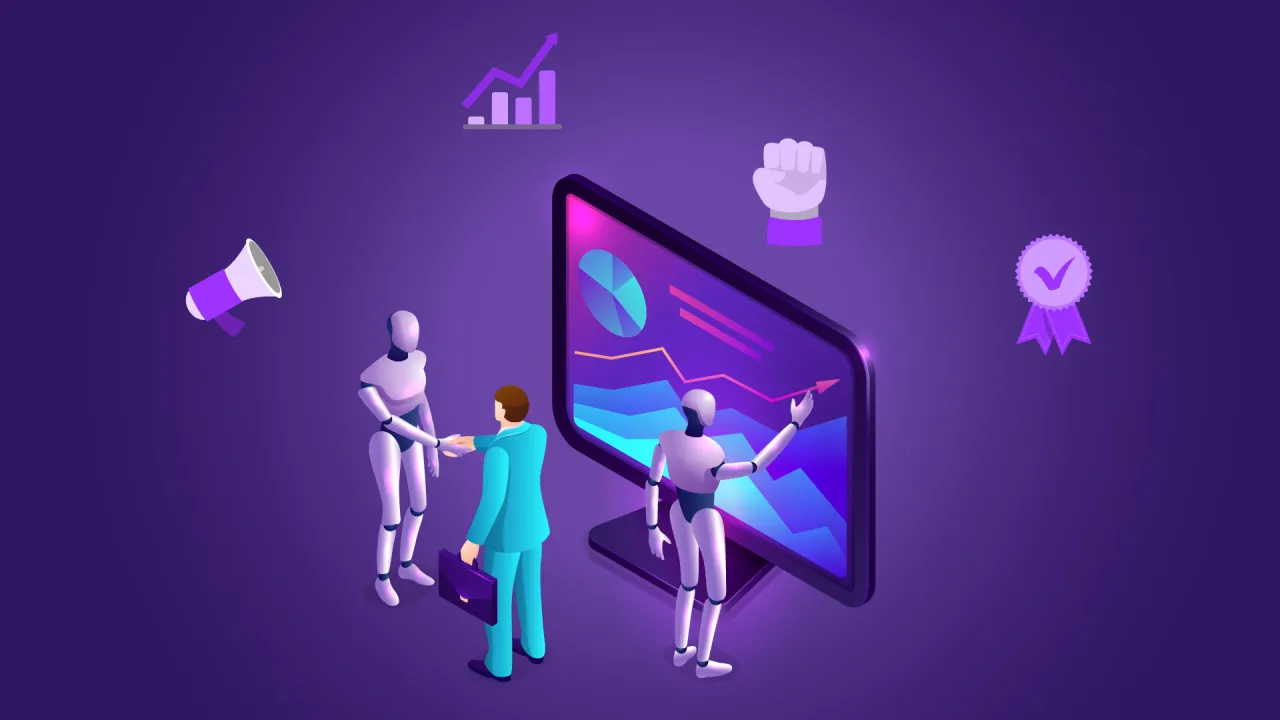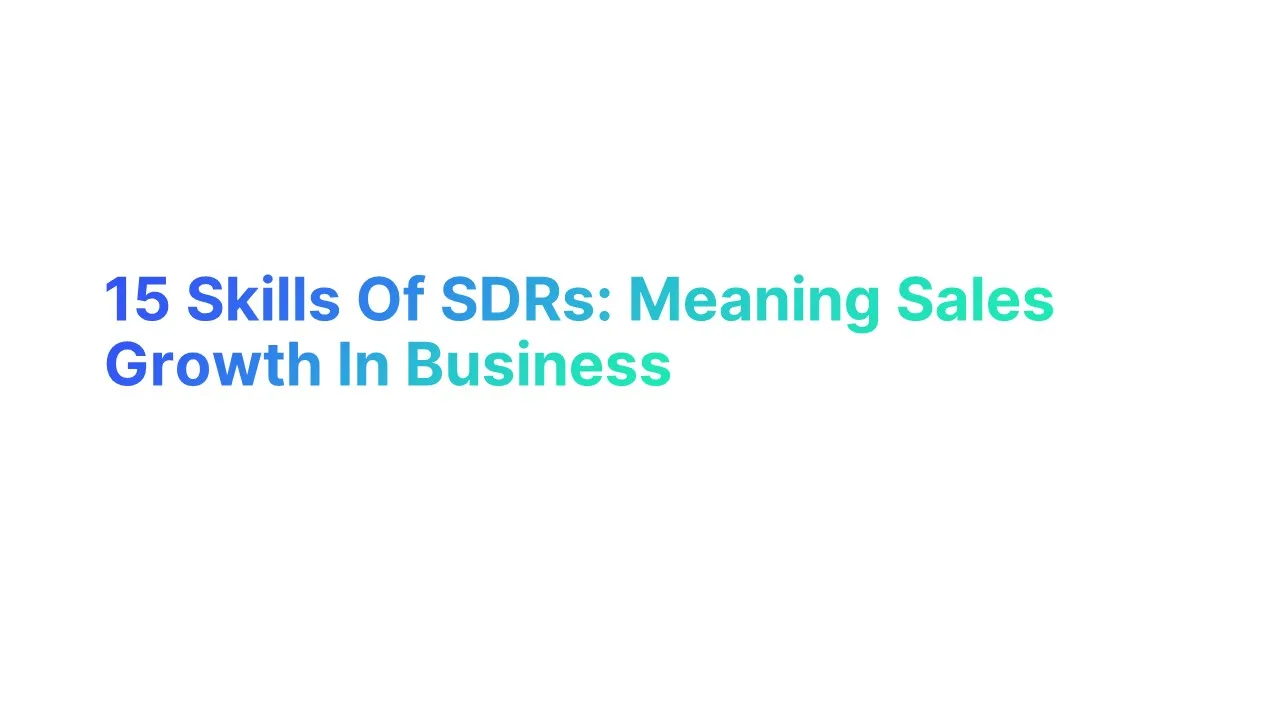What is a Sales Development Representative (SDR)?

An SDR role, or Sales Development Representative, is a person who helps find potential customers for the company. They do not close deals but set up meetings for sales representatives to close sales.
Sales Development Representatives (SDRs) are professionals who specialize in outbound prospecting and lead qualification. Even though it’s an entry-level position, having prior sales experience can be beneficial when applying for a sales development rep role.
For example, if a company sells educational software, an SDR might look for schools or teachers who need better tools for teaching.
Responsibilities of Sales Development Rep
1.Connecting with Prospects
SDRs initiate contact with potential customers through various outbound sales channels such as cold calls, emails, and social media. They gather information from sales-ready leads and communicate with prospects challenges other sales team members, including sales reps.
Research shows that SDRs who use social media in their prospecting outreach efforts have a 40% higher conversion rate compared to those who don’t.
2.Creating First Impressions
They are responsible for making a positive initial impression of the company and its products/services.
According to a study by SalesForce, 80% of prospects say the initial first sales rep or call influenced their buying decision.
3.Educating Prospects
SDRs provide information about the company’s offerings, addressing prospects’ questions and concerns.
62% of B2B buyers make decisions based on the content they encounter during their buying journey.
15 Key Skills of Sales Development Representatives
Sales development reps play a crucial role in the sales process. They help find potential customers and start the sales journey.
These skills can lead to career advancement opportunities, such as becoming a sales manager, who analyzes performance and manages sales development representatives.
Below are 15 important skills every SDR should have:
1. Listening Actively

Listening actively means paying close attention to what someone is saying. It involves understanding their words and their feelings.
Why It Matters:
- Builds Trust: People feel valued when they are listened to.
- Identifies Needs: Helps understand the customer's problems and needs.
- Improves Communication: Ensures you respond correctly to what was said.
How:
- Focus on the Speaker: Look at the person and ignore distractions.
- Nod and Acknowledge: Show you are listening by nodding and saying "I see" or "Yes".
- Ask Questions: If you don’t understand, ask questions to clarify.
- Repeat Key Points: Summarize what the person said to confirm understanding.
Example: Imagine a customer says they are unhappy with their current product. By listening actively, you can understand their specific issues and offer a better solution, showing that you care about their needs.
69% of customers trust a company more if they feel heard.
2. Communication Expertise

Strong communication skills mean clearly sharing information and understanding others. It involves speaking and listening effectively.
Why It Matters:
- Clarity: Clear communication avoids misunderstandings.
- Persuasion: Good communicators can convince others more easily.
- Relationship Building: Effective communication builds strong customer relationships.
How:
- Be Clear and Simple: Use easy words and short sentences.
- Tailor Your Message: Change how you talk based on who you are talking to.
- Use Positive Language: Focus on what you can do for the customer.
- Practice Active Listening: Always listen carefully before responding.
Example: Suppose a customer is worried about the price of your product. Instead of just listing features, explain how your product can save them money in the long run. This makes your message clear and relevant.
Strong communication can improve sales performance by up to 25%.
3. Efficient Time Management

Efficient time management means using your time wisely to get more done.
Why It Matters:
- Boosts Productivity: You can do more in less time.
- Reduces Stress: You can plan better and avoid rushing.
- Improves Focus: You can concentrate better on tasks.
How:
- Create a Schedule: Plan your day with specific times for tasks like calls and emails.
- Use Tools: Use CRM tools to keep track of tasks and deadlines.
- Prioritize Tasks: Do the most important tasks first.
- Avoid Multitasking: Focus on one thing at a time to do it well.
Example: Imagine you have 20 calls to make. By planning your schedule, you can set times for these calls, making sure you complete them without interruptions. This leads to better conversations with potential customers.
Good time management can boost productivity by up to 20%.
4. Deep Product Knowledge

Deep product knowledge means knowing everything about the product you’re selling.
Why It Matters:
- Builds Confidence: You feel more confident talking about the product.
- Answers Questions: You can provide clear, accurate answers to customer questions.
- Shows Expertise: Customers trust you more if you know your product well.
How:
- Study Product Materials: Read manuals, brochures, and online resources.
- Use the Product: Try it yourself to understand it better.
- Attend Training Sessions: Join training sessions to learn more.
- Ask Questions: Learn from more experienced team members.
Example: A potential customer might ask how your product works with their current system. By knowing your product well, you can explain this clearly and highlight the benefits. This builds trust and makes the customer more likely to buy.
79% of buyers expect sales reps to act as trusted advisors, which requires deep product knowledge.
5. Strong Organizational Abilities

Strong organizational abilities mean keeping everything in order and managing tasks efficiently.
Why It Matters:
- Boosts Productivity: Helps you get more done in less time.
- Reduces Stress: Makes it easier to keep track of tasks and deadlines.
- Improves Efficiency: Ensures nothing important is forgotten.
How:
- Use a Calendar: Schedule your tasks and appointments.
- Make To-Do Lists: Write down what you need to do each day.
- Prioritize Tasks: Focus on the most important tasks first.
- Keep Your Workspace Tidy: A clean workspace helps you stay focused.
Example: Imagine you have several customer calls and meetings in one day. By using a calendar and making a to-do list, you can ensure you don’t miss any important tasks. This helps you stay on top of your work and reduces stress.
A study by McKinsey found that organized sales reps are 20% more productive.
6. Skillful Objection Handling

Skillful sales representative objection handling means addressing customer concerns effectively and turning objections into opportunities.
Why It Matters:
- Builds Trust: Shows customers you understand and care about their concerns.
- Increases Sales: Helps turn potential "no's" into "yes's".
- Improves Customer Relationships: Addresses concerns before they become problems.
How:
- Listen Carefully: Understand the customer's objection fully.
- Acknowledge Their Concern: Show that you understand and respect their concerns.
- Provide Solutions: Offer clear, logical solutions to their objections.
- Follow Up: Check back with the customer to see if their concern has been resolved.
Example: A customer might say your product is too expensive. By listening carefully, you can understand their budget concerns.
You might explain how your product's quality and features provide long-term value, which justifies the cost. This helps address their objection and makes them more likely to buy.
Research from Salesforce shows that 70% of buyers are more likely to buy if their objections are handled well.
7. Strategic Prospecting

Strategic prospecting means finding the right potential customers in a smart and planned way.
Why It Matters:
- Increases Success: Finding the right customers leads to more sales.
- Saves Time: You spend time on leads that are more likely to buy.
- Builds Better Relationships: Focusing on the right prospects helps create stronger connections.
How:
- Research: Learn about your target market and find potential customers who fit your product.
- Use Tools: Use CRM tools to track and manage prospects.
- Qualify Leads: Make sure the prospects have a need for your product and can afford it.
- Reach Out: Contact prospects through calls, emails, and social media.
Example: Imagine you are selling software to small businesses. By researching and finding businesses that need software solutions, you can focus your efforts on those who are more likely to buy, saving time and increasing your chances of success.
Companies that excel at lead management can see a 50% increase in sales-ready leads.
8. Effective Lead Management

Effective lead management means handling and nurturing potential customers until they are ready to buy. Sales operations play a crucial role in managing leads and the sales process.
Why It Matters:
- Increases Conversions: Proper lead management turns prospects into customers.
- Improves Customer Experience: Helps provide the right information at the right time.
- Streamlines Sales Process: Keeps track of leads and their progress through the sales funnel.
How:
- Track Leads: Use CRM tools to monitor leads and their interactions.
- Nurture Leads: Provide valuable information and follow up regularly.
- Score Leads: Prioritize leads based on their readiness to buy.
- Close the Deal: Once leads are ready, work with sales reps to close the sale.
Example: A lead shows interest in your product but is not ready to buy immediately. By nurturing the lead with helpful information and regular follow-ups, you can keep them engaged until they are ready to make a purchase.
Businesses that nurture leads make 50% more sales at 33% lower cost.
9. Qualifying Leads

Qualifying leads means finding out if potential customers are a good fit for your product and moving them further down the sales cycle.
Why It Matters:
- Saves Time: Focus on leads that are more likely to buy.
- Increases Success: Higher chances of closing sales with qualified leads.
- Improves Efficiency: Spend resources on the right prospects.
How:
- Ask Questions: Find out the needs, budget, and timeline of the potential customer.
- Use Criteria: Check if the lead matches your target market.
- Score Leads: Rate leads based on how likely they are to buy.
- Follow Up: Stay in touch with qualified leads to move them through the sales process.
Example: Imagine you are selling a software solution. By asking a lead about their current software, budget, and decision timeline, you can see if they are a good fit. If they are not ready to buy now but show interest, you can follow up later.
Research shows that companies with strong lead qualification processes see a 20% increase in sales opportunities from prospective clients.
10. Building Meaningful Rapport

Building meaningful rapport means creating a strong and positive relationship with potential customers.
Why It Matters:
- Builds Trust: Customers are more likely to buy from someone they trust.
- Enhances Communication: Good rapport leads to better conversations.
- Improves Customer Experience: Makes the customer feel valued and understood.
How:
- Be Genuine: Show real interest in the customer's needs and problems.
- Find Common Ground: Talk about shared interests or experiences.
- Use Active Listening: Pay close attention and respond thoughtfully.
- Follow Up: Stay in touch and show that you remember past conversations.
Example: A customer mentions they love a specific sports team. By sharing that you also enjoy that sport, you create a personal connection. This helps build trust and makes the customer feel valued.
Studies indicate that 79% of buyers say it’s crucial to buy from a company they trust.
11. Mastering Body Language

Mastering body language means understanding and using non-verbal signals to communicate effectively.
Why It Matters:
- Builds Trust: Positive body language helps build trust with potential customers.
- Improves Communication: Non-verbal cues can support and enhance your verbal messages.
- Increases Confidence: Good body language makes you appear more confident and competent.
How:
- Maintain Eye Contact: Look at the person you are speaking to, showing interest and confidence.
- Use Open Gestures: Avoid crossing your arms. Use open and inviting gestures to seem more approachable.
- Smile: A genuine smile can create a positive atmosphere.
- Pay Attention to Posture: Stand or sit up straight to show confidence and attentiveness.
Example: Imagine you are meeting a potential customer. By maintaining eye contact, smiling, and using open gestures, you create a welcoming and trustworthy environment. This makes the customer feel more comfortable and willing to engage with you.
Research shows that body language can account for up to 55% of communication.
12. Proficiency in Video Prospecting

Proficiency in video prospecting means effectively using video calls to connect with potential customers.
Why It Matters:
- Personal Connection: Video calls allow for a more personal connection than emails or phone calls.
- Visual Cues: You can use visual aids and body language to enhance communication.
- Flexibility: Video calls can be scheduled more flexibly, making it easier to connect with busy prospects.
How:
- Prepare Your Space: Ensure your background is tidy and professional. Good lighting and a clear, non-distracting background are important.
- Use Quality Equipment: Use a good camera and microphone to ensure clear audio and video.
- Practice: Practice speaking clearly and confidently on camera.
- Engage Visually: Use slides or product demos to make your presentation more engaging.
Example: During a video call, you can share your screen to show a product demo. This allows the potential customer to see the product in action and ask questions in real-time. This interactive experience can make your presentation more impactful and memorable.
According to a study by HubSpot, sales reps who use video in their prospecting efforts see a 26% increase in meetings booked.
13. Cold Calling and Cold Emailing

Cold calling and cold emailing are techniques to reach out to potential customers who haven't expressed interest yet.
Why It Matters:
- Builds Pipeline: Helps in finding new potential customers.
- Starts Conversations: Opens the door for future communication.
- Gathers Information: Helps understand customer needs and interests.
How:
- Prepare a Script: Have a clear, concise message ready.
- Personalize: Make the call or email relevant to the person you are contacting.
- Follow Up: Don't give up after one attempt. Follow up to keep the conversation going.
- Practice: The more you practice, the better you get.
Example: Imagine you are calling a potential customer. You introduce yourself, mention how your product can solve a common problem they face, and ask if they are interested in learning more. If they say yes, you can set up a meeting to discuss further.
According to a study by Rain Group, 82% of buyers accept meetings with sales reps who reach out to them.
14. Educating Prospects

To Educate prospects means to provide useful information to potential customers about your product or industry.
Why It Matters:
- Builds Trust: Shows that you are knowledgeable and helpful.
- Nurtures Leads: Keeps potential customers engaged until they are ready to buy.
- Differentiates You: Sets you apart from competitors who might not offer the same level of information.
How:
- Share Content: Provide articles, videos, or webinars that explain your product or industry.
- Answer Questions: Be available to answer any questions they might have.
- Follow Up: Check in regularly to provide new information and see if they have more questions.
- Use CRM Tools: Track what information has been shared and what follow-ups are needed.
Example: A potential customer asks how your product works. You send them a video demo and a detailed article explaining the features and benefits. Then, you follow up a week later to see if they have any questions and offer to provide more information.
HubSpot reports that businesses that educate their prospects see a 20% increase in sales opportunities.
15. Commitment to Continuous Learning

Commitment to continuous learning throughout your sales career means always seeking to improve your skills and knowledge. Sales managers often provide career advice and support for SDRs to help them grow in their roles.
Why It Matters:
- Keeps You Updated: Sales techniques and tools are always changing. Staying updated helps you stay ahead.
- Improves Performance: Learning new skills can make you more effective at your job.
- Boosts Confidence: Knowing more makes you feel more confident in your abilities.
How:
- Take Courses: Enroll in online courses related to sales and your industry.
- Read Books and Articles: Read about the latest trends and techniques in sales.
- Attend Workshops and Seminars: Participate in events where you can learn from experts.
- Seek Feedback: Ask for feedback from your managers and peers to identify areas for improvement.
- Join Professional Groups: Be part of sales communities where you can share and learn from others.
Example: Imagine you are an SDR who wants to improve your cold calling skills. You take an online course on effective cold calling techniques. You learn new strategies and start applying them in your calls. As a result, you see an increase in the number of successful calls and meetings booked.
According to LinkedIn, employees who spend time learning at work are 47% less likely to be stressed and 39% more likely to feel productive. A study by Deloitte found that companies with strong learning cultures are 92% more likely to innovate.
The Role of AI in SDR Sales Development

1. Identifying Potential Customers
AI helps SDRs identify potential customers who are more likely to be interested in their products.
Saves Time: AI can quickly analyze large amounts of data to find the best leads.
Increases Accuracy: AI can identify patterns and trends that humans might miss.
Boosts Efficiency: SDRs can focus on leads that are more likely to convert.
How does it helps:
Data Analysis: AI analyzes customer data to identify potential leads.
Predictive Analytics: AI predicts which leads are most likely to convert based on past data.
Automated Lead Scoring: AI scores leads based on their likelihood to convert.
Example: An AI tool analyzes past customer data and identifies that schools are more likely to need educational software in the fall. It then prioritizes leads from schools during this period, helping SDRs focus their efforts on the most promising prospects.
2. Personalizing Outreach
AI helps SDRs personalize their messages to potential customers.
Builds Relationships: Personalized messages are more likely to engage potential customers.
Increases Response Rates: People are more likely to respond to messages that are relevant to them.
Improves Customer Experience: Personalized communication makes customers feel valued.
How does it helps:
Email Personalization: AI crafts personalized email messages based on customer data.
Chatbots: AI-powered chatbots can engage with leads on websites, providing personalized responses.
Social Media Engagement: AI analyzes social media activity to tailor messages to individual leads.
Example: An AI tool analyzes a lead's social media activity and discovers they are interested in new technology. The best SDR tool can then send a personalized email highlighting the tech features of their product, increasing the chances of a positive response.
3. Automating Routine Tasks
AI can automate routine tasks, freeing up SDRs to focus on more important activities.
Increases Productivity: SDRs can spend more time on tasks that require human creativity and judgment.
Reduces Errors: Automation reduces the risk of human error in repetitive tasks.
Saves Time: SDRs can complete tasks more quickly with the help of AI.
How does it helps:
Scheduling: AI can schedule meetings and follow-up emails automatically.
Data Entry: AI can input and update customer information in CRM systems.
Reporting: AI can generate reports on lead status and sales performance.
Example: An AI tool automatically schedules follow-up emails to leads who have expressed interest in a product. This ensures timely communication and allows SDRs to focus on engaging with new leads.
Conclusion
Sales Development Representatives (SDRs) are crucial for business growth. They help find potential customers, known as leads, and start the sales process. This means more sales opportunities and a better sales pipeline.
SDRs use skills like active listening and strong communication to connect with leads. They use AI tools to find the right prospects and manage leads efficiently. This makes the sales process smoother and more successful.





.jpg)

.jpg)
